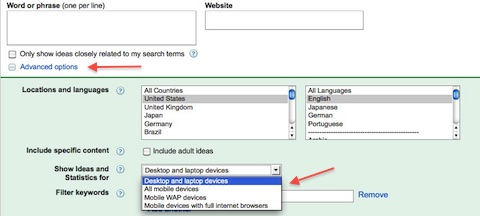Google mobile search and Google search are two different animals and understanding more about both has become a necessary evil. Currently, the results returned when doing a search on a mobile device can vary greatly from those done on a desktop (SEORoundtable)
The biggest difference being that Google figures if you’re on a mobile it’s likely your intent is more local focused – plus it’s easier to know exactly where the search is being conducted.
The other issue is that people turning to the mobile browser tend to search on that device a little differently, think more abbreviated, than they do on the desktop and that’s something we all need to understand a little better.
The Google Keyword Tool is a tool that every marketer must have in the toolbox as a quick way to understand some data on the kinds of things people are actually searching for – or at least the actual words and phrases they use most when looking for what you offer.
The tool recently received a nice little update with the addition of mobile search data. Using this tool is the first step to understanding the keyword differences inherent in mobile search. The reason I think this is such an important topic is that at some point mobile search will be the dominant form of search – it’s already there for some industries. (BIA Kelsey Report)
It’s time to start thinking about blending some of your keyword strategies to make them more mobile centric – and of course getting serious about local optimization. (5 Ways to Make Your Website Scream Local)
Some observation’s from playing with the tool:
- If you sell something that is mobile related or found primarily via a phone you’ll get far better keyword ideas
- You can now have a much fuller picture of the search volume for phrases – mobile is doubling and tripling volume estimates
- This is a pretty significant piece in the local search optimization game
Here’s Google’s official help page for using the Keyword Tool.
Originally published at DuctTapeMarketing.com








 WebProNews is an iEntry Publication
WebProNews is an iEntry Publication